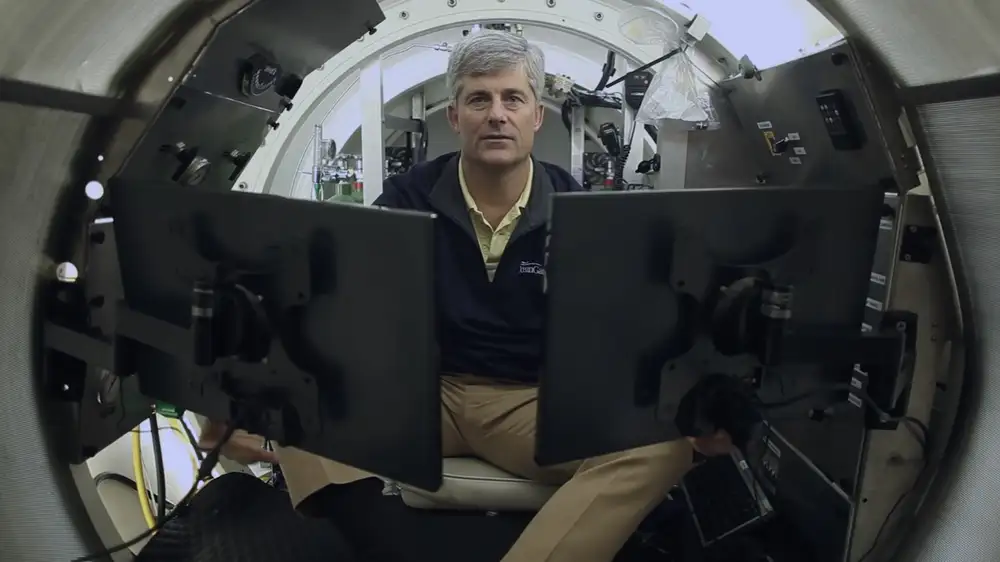Titan: The OceanGate Submersible Disaster takes us behind the scenes of the case, speaking to former employees of CEO Stockton Rush. Though he’s been accused of being a psychopath in the past, how much of this is true?
For most viewers watching the Netflix documentary, the popping sounds from the Titan submersible tests would be enough to never get in it again, but Stockton Rush kept on going, promoting OceanGate as a SpaceX-level pioneer of the watery depths.
The warnings weren’t subtle; engineers walked away, industry veterans issued public statements, former employees begged him to listen. He pushed forward anyway, not just risking the lives of others, but ultimately climbing aboard the Titan himself for its final, fatal descent on June 18, 2023.
All five passengers died when the vessel imploded due to the surrounding pressure. The question remains: did he truly not understand the science and the risks, or did he understand it all – and simply believe he was above it?
Was Stockton Rush a psychopath?
Without a clinical diagnosis, there’s no way to know for sure. But Dr. John Paul Garrison, a clinical and forensic psychologist, acknowledges evidence of grandiosity and risk-taking behavior, two traits often associated with psychopathy.
That being said, Garrison highlights that his “analysis is based on publicly available information and not on a formal psychological evaluation.” And he also does not give a definitive label, because without in-person clinical testing and interviews, no psychologist can.
Still, certain patterns are interesting to take into account, especially with the further context provided in Titan: The OceanGate Submersible Disaster.
Psychopathy is more than a lack of empathy. It can involve an inflated sense of self-importance, a disregard for rules, and a willingness to endanger others – or oneself – in pursuit of a goal.
According to former OceanGate employees, Rush displayed a dangerous combination of charm and hubris. He dismissed conventional safety testing and compared himself to figures like Elon Musk – men who take risks in the name of progress, without considering the consequences.
In the new documentary, footage shows him brushing off warnings with confidence, and in another clip he describes the “luck” behind his ventures. “I don’t know if Elon Musk came up with this but luck is the number one superpower,” he says.
“Anybody who’s done anything in the ocean appreciates luck.” It’s that kind of mindset – idealistic on the surface but reckless behind the scenes – that fuels the psychopathy speculation.
In his analysis, Dr. Garrison points to a talk Rush gave shortly before the disaster, in which he describes the Titan sub as a cutting-edge feat of engineering, even as serious concerns about its design had already been raised.
At one point, Rush even discusses taking families on future dives to the Titanic wreck. “We hear him talking about the idea of taking whole families down there,” Garrison says.
“The idea that he’s willing to risk people’s lives to do these things… is this someone who is truly risk-averse, or someone willing to risk other people’s lives in order to have those experiences, in order for him to start building more of a business that explores the ocean?”
Rush’s grandiosity becomes more apparent in the way he frames OceanGate, not as a submersible company, but as an extraordinary experience for exploration enthusiasts.
“This sounds all well and good… but it’s also an unspeakably risky and dangerous proposition,” Garrison says. “The grandiosity comes in that he wants these things, but they’re not practical – that’s not really how things work when it comes to the deep ocean.”
Traits may have led to OceanGate disaster
Several psychological mechanisms may have contributed to Rush’s mindset. One, Garrison explains, is overconfidence bias: “In other words, someone is overconfident in their abilities.
“For example, his confidence in the unique design of the Titan, despite the fact there were deep-sea explorers that did not think it was a good idea… someone with an overconfidence bias is going to go more on their own judgment than experts in the field.”
Another is the illusion of control. “This one, it’s hard to dispute,” Garrison says. “An inflated sense of control… can lead them to taking greater risks and minimizing safety concerns because they believe that they have control over the situation.”
Garrison also questions how open Rush truly was to criticism. “I’m curious if he was immune to criticism – how much he was really willing to take criticism to heart,” he says. The documentary suggests not much. Many former employees expressed serious doubts, and were ignored, left the company, or were fired.
There are also signs of a grandiose sense of self-importance, Garrison adds. Rush spoke about descending into the ocean and being the only human to ever see certain creatures.
“He didn’t put it in those words, but that’s in essence the message,” Garrison says. “If he’s doing that, it likely means he’s not respecting inherent risks – because this is what we see with people that are grandiose. They minimize inherent risk.”
Ultimately, Garrison believes these cognitive biases may have prevented Rush from truly accepting the dangers involved. “He may understand them on an intellectual level, but it doesn’t sound like he may have taken them as seriously as a lot of other people did,” he explains.
The traits Garrison mentions – grandiosity, overconfidence, disregard for risk, unwillingness to accept criticism, and charm – are typically associated with psychopathy. However, as said, they’re not enough on their own to confirm a diagnosis.
Netflix documentary reveals truth about Princeton
The Netflix documentary also reveals that Stockton Rush attended Princeton University, but his grades weren’t too impressive. He reportedly received mostly Cs, Ds, and even an F.
Despite this, Rush often spoke of having once dreamed of becoming an astronaut, claiming he couldn’t due to his poor eyesight. However, it’s a career path that demands not just top physical fitness but also high academic achievement in science and engineering.
And yet, he continued to present himself as someone destined for greatness – whether in space or the sea. This adds another layer to the patterns discussed by Dr. Garrison.
Grandiosity isn’t just about arrogance – it’s often about the individual believing themselves to be exceptional in spite of contrary evidence. It also raises questions about his ambition. Was Rush trying to overcorrect for perceived failures or inadequacies by proving he could accomplish something no one else dared to?
Garrison’s analysis touches on this kind of psychology, where inflated self-belief and the illusion of control override logic. These factors have sparked plenty of discussion from viewers of Titan: The OceanGate Submersible Disaster.
One wrote on Reddit that the documentary is “especially laudable” due to the “contextualizing of his turn from sky to ocean – after he had come to terms with the fact that he didn’t have the right stuff to be an astronaut.”
Another said, “For me the most damning part was the footage of Rush alone in the sub on the first dive to depth in the Bahamas. To me, it seemed like he was barely holding it together and yet he came back and was all smiles, so cheerful, a total success!”
“Stockton is so arrogant, he thought he was doing something ground breaking,” added a third.

 TCL raddoppia lo spettacolo: tablet in regalo acquistando una TV C7K, C79K, Q7C
TCL raddoppia lo spettacolo: tablet in regalo acquistando una TV C7K, C79K, Q7C